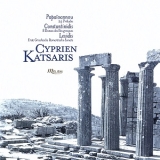Der heute 71 Jahre alte französische Pianist Cyprien Katsaris beginnt mit diesem Programm eine Reihe von Aufnahmen für Melism, die der griechischen Musik nach der Unabhängigkeit des Landes im Jahr 1821 gewidmet sind, Musik, die außerhalb Griechenlands kaum bekannt ist.
Von Yannis A. Papaïoannou (1910-1989) spielt er zunächst die 24 Préludes pour piano. Cyprien Katsaris bemerkt dazu: « Es steht außer Frage, dass Papaïoannou mit seinen 24 Präludien ein wahres Meisterwerk geschaffen hat, das über die Einflüsse Debussys hinausgeht. Man braucht sich den Zyklus nur in seiner Gesamtheit anzuhören, um die ganze Bandbreite seiner Aromen zu genießen. Es ist unverständlich, dass diese Sammlung zusammen mit den übrigen Werken des Komponisten in Vergessenheit geraten ist. Es ist höchste Zeit, diesen zweifellos bedeutenden Komponisten zu rehabilitieren ».
Jedes Prélude hat einen deskriptiven Titel, wie z.B. Aquarelle, Clair De Lune, Miss A J Eccentric, Tziganiana oder Poisson d’Or. Das verlangt vom Pianisten ein feines Gespür für die impressionistischen Farben und alle Nuancen, mit denen Papaïannou diese Miniaturen erdacht hat. Und Katsaris hat auch zweifellos Recht mit seiner oben geäußerten Begeisterung über diesen Zyklus: die Liebe, die er dieser Musik gibt, ist in seiner hinreißenden Interpretation spürbar. Schöner, poetischer und attraktiver kann man diese Komposition nicht spielen.
Auch bei Yannis Constantinidis (1903-1984) und seinen 8 Danses de Iles Grecques bleiben wir beim Impressionismus, den er fantasievoll mit der Folklore der griechischen Inseln mischt. Das hört man in den feinen, pastellfarbenen Evokationen, die mit den typischen Rhythmen der Volksmusik kontrastieren. Auch diesen Zyklus spielt Katsaris sehr inspiriert.
Für seine Erste Griechische Romantische Sonate erhielt Dimitry Levidis (1886 – 1951) den Franz-Liszt-Kompositionspreis in München, was nicht weiter verwundert, denn diese Komposition klingt wie Liszt, bei aller Eigenständigkeit und persönlicher Einfallskraft des Komponisten. Cyprien Katsaris spielt sie brillant und mit Elan.
Und so ist dem Pianisten eine wunderbare CD gelungen. Er hat nicht nur ein Repertoire aufgenommen, das unbedingt bekannt werden soll, sondern er bedient es auch mit der typischen Feinfühligkeit, die den großen Reichtum seines Interpretierens immer schon auszeichnete, und weiß so die drei Werke ins rechte Licht zu setzen.
With this program, French pianist Cyprien Katsaris, now 71, begins a series of recordings for Melism devoted to Greek music after the country’s independence in 1821, music that is little known outside Greece.
From Yannis A. Papaïoannou (1910-1989), he first plays the 24 Préludes pour piano. Cyprien Katsaris remarks: « There is no question that Papaïoannou created a true masterpiece with his 24 Preludes, which goes beyond the influences of Debussy. One need only listen to the cycle in its entirety to enjoy the full range of its flavors. It is incomprehensible that this collection has been forgotten along with the rest of the composer’s works. It is high time to rehabilitate this undoubtedly important composer. »
Each Prélude has a descriptive title, such as Aquarelle, Clair De Lune, Miss A J Eccentric, Tziganiana or Poisson d’Or. This requires the pianist to have a keen sense of the impressionistic colors and all the nuances with which Papaïannou conceived these miniatures. And Katsaris is also undoubtedly right in his enthusiasm expressed above about this cycle: the love he gives to this music is palpable in his ravishing interpretation. There is no more beautiful, poetic and attractive way to play this composition.
Also with Yannis Constantinidis (1903-1984) and his 8 Danses de Iles Grecques we stay with impressionism, which he mixes imaginatively with the folklore of the Greek islands. This can be heard in the delicate, pastel evocations that contrast with the typical rhythms of folk music. Katsaris’ paying is again very inspired.
Dimitry Levidis (1886 – 1951) received the Franz Liszt Composition Prize in Munich for his First Greek Romantic Sonata, which is not surprising, since this composition sounds like Liszt, despite all the composer’s independence and personal inventiveness. Cyprien Katsaris plays it brilliantly and with verve.
And so the pianist has succeeded in creating a wonderful CD. Not only has he recorded a repertoire that should definitely be known, but he also handles it with the typical sensitivity that has always characterized the great richness of his interpretations, and thus knows how to put the three works in perspective.






















